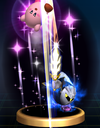Meta Knight (SSBB)
| Meta Knight in Super Smash Bros. Brawl | |
|---|---|
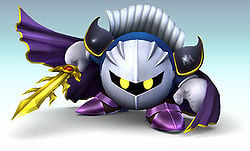 
| |
| Universe | Kirby |
| Other playable appearances | in SSB4 in Ultimate |
| Availability | Starter |
| Final Smash | Galaxia Darkness |
| Tier | SS (1) |
Meta Knight (メタナイト, Meta Knight) is a character in Super Smash Bros. Brawl. Originally from the Kirby universe, Meta Knight was unveiled at E3 2006, and joins the Brawl as a starter newcomer who wields a sword, Galaxia, as his primary weapon.
Atsushi Kisaichi, who voiced the character in the Japanese version of Kirby: Right Back At Ya!, reprises his role in the Japanese version of Brawl through re-purposed voice clips. In English, he is voiced by Eric Newsome, who mimics Eric Stuart's portrayal of Meta Knight from the anime's English dub.
Meta Knight is notable for being at the top of the Brawl tier list (that being 1st out of 38 characters, standing alone in the SS tier, thus being his best placement in the series) due to numerous advantages. Meta Knight is a very fast character with fast ground speed, five mid-air jumps, multiple air options which give him great mobility and he has excellent frame data all around. Meta Knight also possesses many disjointed attacks with great range and transcendent priority, which along with the speed of his attacks, easily allows him to keep out opponents and interrupt their approach without much risk, especially since Meta Knight is a small target. Meta Knight overall has an excellent set of ground moves and aerials which are complemented greatly with Meta Knight's mobility, attributes and overall range. Meta Knight's edgeguarding and recovery are both unarguably the best in the game due to the sheer amount of options MK has. With five mid-air jumps, excellent aerials, the ability to glide both manually and out of Shuttle Loop and having an entire set of special moves which can be used to recover, Meta Knight can easily make it back from anywhere off stage (while also being extremely difficult for the opponent to edgeguard him) and he can go incredibly deep for edgeguards. These factors also naturally give Meta Knight a very strong camping game as he can utilize his multiple jumps and aerials to stall either at the ledge or in the air which is very difficult to deal with. He also has many great combo setups, with a very strong combo game due to easily being able to string many of his attacks together due to his quick speed and frame data. His KO moves are quick, powerful, and reliable in addition to often being long ranged and even completely safe in some cases. Meta Knight also possesses two incredible special moves in Mach Tornado and Shuttle Loop. The former is an incredible mobility/recovery option which is very difficult for most characters to challenge/punish while the latter is not only a fantastic recovery move (putting MK into a glide) but it is also a fast, safe and powerful long ranged attack with a great amount of utility. The grounded version is excellent for shutting out approaches or punishing unsafe moves while the aerial version is a very powerful semi-spike which can lead to some very early KOes off stage, especially if the opponent does not DI it correctly.
Meta Knight does have a few weaknesses, however. Meta Knight is a lightweight character, meaning he is knocked out fairly easily, especially against characters with many high-power attacks such as Snake although he does have strong horizontal momentum canceling. Meta Knight also lacks any sort of projectile or reflector, which can give him trouble against projectiles although his small size, fast ground speed, multitude of jumps and Mach Tornado give him strong options to play around projectiles, especially if they lack transcendent priority. Meta Knight also has poor air speed and while he can work around this in numerous situations, there are scenarios where poor air speed limits him, particularly in tight juggle situations. He also has a small shield which makes him somewhat vulnerable to shield stabbing from certain characters. Meta Knight's combination of high gravity and air friction also give him a fairly exploitable aerial grab release animation, which multiple characters can exploit, especially since Meta Knight can be forced into the animation by multiple characters. Marth for example, can put Meta Knight into an aerial grab release and then followup into a variety of guaranteed moves, including forward aerial, dash attack, Dancing Blade, short hop Dolphin Slash, buffered down aerial, buffered up aerial, or buffered neutral aerial. Although Meta Knight has a great array of recovery options, they all leave him helpless so when used at the wrong time, they can be exploitable, although this can easily be avoided by strong players. He additionally may have trouble KOing against good DI and/or momentum canceling, particularly if his best finishers are getting stale. He also has many multi-hit moves that are susceptible to SDI, which can limit his ability to rack up damage easily, along with most of his moves having unspectacular raw damage output. These weaknesses however are either very difficult to exploit (especially for lower tiered characters) and/or Meta Knight can easily work around them.
Overall, Meta Knight's strengths virtually remove his weaknesses all together. He is an incredibly potent character with a large array of very strong attributes including his excellent mobility, range, frame data and aerial game while his weaknesses are difficult to exploit and can often be worked around, making them relatively minor overall. Meta Knight in general is a character with an excellent offensive and defensive game. He can play very aggressively, utilizing the speed and range of his attacks to chip away at his opponent before he can KO them, but he can also play very defensively with Meta Knight being able to take the life lead and camp for a long period of time by utilizing his frame data/range to shut out his opponent's approaches.
As a reflection of this, Meta Knight has an incredible matchup spread, with Meta Knight arguably winning every single matchup in the game. Meta Knight's attributes and toolset overall give him the tools he needs to overcome or even dominate other members of the cast and while some characters can exploit Meta Knight's weaknesses, he can also exploit their weaknesses to an even greater degree. The only matchup which is arguably considered not winning for Meta Knight is Ice Climbers as a single mistake from Meta Knight should result in a stock loss for him with the Ice Climbers' incredible grab game. Meta Knight however can play around the Ice Climbers well and if Meta Knight separates the Ice Climbers, he can easily KO the partner climber from there, and a solo climber is helpless against Meta Knight. This matchup overall is often considered to be slightly in Meta Knight's favor although the matchup is close and an argument could be made for the Ice Climbers winning or at least going even. Pikachu was also once considered to be a potentially even matchup for Meta Knight (even being listed as such on the 2013 Smash Back Room matchup chart) although by the end of the game's life, this matchup was considered winning for Meta Knight.
As a result of all of this, Meta Knight received the most representation and success in tournaments in the game by far, to the point of over-centralization of the metagame, reflected by Meta Knight being placed in his own tier, SS, at the very top of the 2013 tier list. Meta Knight's general unpopularity in the Super Smash Bros. community (he was and is considered "broken" by many players) led to him being the first character in any Smash game to be banned, between January 9th, 2012 and April 16, 2012, at which point the Unity Ruleset which enacted the ban was disbanded. This makes Meta Knight, Cloud, Bayonetta, Hero and Steve the only characters in the Super Smash Bros. series who have been banned from a standardized tournament ruleset, although Bayonetta, Hero and Steve's respective bans were far less prominent and Cloud was exclusively banned in doubles. Overall, Meta Knight's incredible strengths and minor weaknesses have led many to consider him to be not only the best character in the game, but also arguably the best character in the entire Smash series.
Attributes[edit]
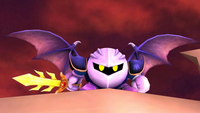
Meta Knight is a small character, roughly the same size and shape as Kirby, and with the same weight as Pikachu. He also boasts the sixth fastest dash speed, fast walking speed, average falling speed (although he does have above average gravity), and average air acceleration, though his air speed is very low, tied for the third worst.
Meta Knight's greatest asset is his extremely fast frame data. Almost all of his moves have little startup and ending lag. The best example is in his up aerial, which can be performed three times within a short-hop, with it coming out on frame 2 and the move can be canceled as early as frame 14. The reach of his attacks, though average overall, is disproportionate to his small hurtbox. As Meta Knight has a sword, many of his moves are disjointed, and many of his moves possess transcendent priority, except for Mach Tornado, Drill Rush, dash attack, and glide attack. When combined with his incredible attack speed, this makes Meta Knight's attacks very difficult to challenge and punish, giving him a powerful neutral game and approach, even though he lacks a projectile. He can easily pressure with his aerials and tilts, and his neutral special, Mach Tornado, covers a long horizontal distance and offers great protection, making it a potent approach option that is difficult to counter. All of his aerials are also capable of auto-canceling in a short hop, making them excellent tools to approach or retreat with. Though Meta Knight's air speed is poor, he is gifted with five midair jumps and the ability to glide twice, allowing him to weave in and out of danger.
While Meta Knight's moves deal fairly low damage, their speed and low power allow them to easily chain into one another, giving him a strong combo game. Again, this is demonstrated by his up aerial. Combined with his jumps, his up aerial combos into itself for as much as 30%, due to its speed and low knockback, and it can lead into other moves as well, such as Mach Tornado and Shuttle Loop. His KO power is also solid, especially for a lightweight. Though his forward smash has high startup and it is not very strong for a forward smash, it is his strongest finisher and it has low ending lag, potentially making it impossible to punish in some situations. Shuttle Loop has high knockback (especially at low percents), quick start-up, and is difficult to punish, as he can glide away to safety. Down smash is quick, hits on both sides, and has high power, making it his most reliable grounded KO move. His glide attack is fast, and can KO early near the upper blast line, though it is rather telegraphed.
Contributing to Meta Knight's strong KO power is his offstage game. Aside from up aerial, all of his aerials are viable finishers offstage. Neutral aerial is very fast and has relatively high knockback, his forward and back aerials can be used to perform a pseudo-wall of pain, and his down aerial is a deadly semi-spike. Aerial Shuttle Loop is a semi-spike with very high base knockback, making it a very powerful tool to stage-spike recovering opponents and unwise edgeguarders. His incredible recovery compliments his superb air game. He has five midair jumps and the ability to glide twice. Mach Tornado offers great horizontal distance, decent height, and protection. Drill Rush is horizontal and can be angled. Dimensional Cape allows him to vanish and move in any direction before reappearing. Finally, Shuttle Loop grants high vertical distance, and transitions into a glide. Altogether, these factors give Meta Knight the best recovery in the game as it can theoretically travel an infinite horizontal distance, it is extremely difficult to punish and Meta Knight has many ways to mix his recover up. Despite lacking a meteor smash, his recovery and dominating air game make him a terror to face offstage, as he is capable of gimping and edge-guarding almost any foe.
However, Meta Knight has notable weaknesses. Being a lightweight, he has very poor endurance, though his quick momentum cancel in his up aerial aids him slightly. His above average gravity and air acceleration also gives him a rather exploitable aerial grab release animation, which leaves him vulnerable to grab release followups, notably against Marth, who can combo him into a variety of moves, including a down aerial meteor smash. His poor air speed, while easily worked around in some situations, can give him a hard time avoiding moves like Pikachu's Thunder. Meta Knight has many multi-hit moves that can be SDI'ed out of, such as his forward/back aerials, limiting his ability to rack up damage against strong players, and this compounds his damage output, which is average at best. Though his neutral and approach games are strong, he has trouble fighting against competent campers, such as Snake and Falco. Meta Knight has a rather long 32-frame delay before he can meteor cancel. Combined with his light weight, this gives him trouble against characters with useful meteor smashes, particularly Falco. However, his extremely effective recovery negates much of this issue.
Overall, Meta Knight has overwhelming combat prowess, and his weaknesses are hard to exploit and can be worked around. His mobility, attack speed, range, priority, and recovery allow him to play both aggressively and defensively, give him a variety of ways to play depending on the situation, as well as giving him plenty of room for error against most characters.
Moveset[edit]
For a gallery of Meta Knight's hitboxes, see here.
| Name | Damage | Description | ||
|---|---|---|---|---|
| Neutral attack | Flurry Attack (フラリーアタック) | 1-2% (loop) | When held, Meta Knight yells and executes a quick series of slashes that can also hit enemies behind him. Interestingly, it is the only neutral infinite in the game which has a finisher animation with a normal hitbox, which would become a standard feature for neutral infinites in future installments. The move can be used to jab lock opponents and it can set up a down smash in certain situations. The move does suffer from high startup lag for a neutral attack however, and Meta Knight's opponent can easily escape the loop hits. The loop hits have very low horizontal knockback and when combined with the long gap between hits, this can allow opponents to punish Meta Knight on hit or at least shield the later hits right up until higher percents. Even if the later hits are guaranteed, the opponent may still be pushed too far away to get hit by them, leaving Meta Knight in an exploitable spot. It is overall one of Meta Knight's worst moves and one of the worst neutral attacks in the game, although it does have a few situational uses. | |
| Forward tilt | Diagonal Slash (袈裟斬り, Kasaya Cutter/Slash Counter Slash (返し斬り, Return Cutter/Slash) Flip Up (跳ね上げ) |
4% | Slashes twice in front of him (inward then outward), then once upwards. The first two hits deal very low knockback while the final hit deals higher vertical knockback. The full move requires 3 consecutive button presses, with each press further continuing the act. The player has to press the attack button very quickly in order to perform all three hits as quickly as possible (if it does not hit the opponent) which can be difficult to do. The move has very low startup lag, great disjointed range, decent damage output if all hits connect and the first hit has low enough ending lag to give it strong mixup potential. Meta Knight can either perform all three hits or simply perform only the first hit or the first two hits, which gives the move very strong mixup potential, as well as making it difficult to punish for most characters, even at close range, especially since Meta Knight can mix up the timing of his forward tilts. At higher percents, it can be difficult to connect all three hits depending on the opponent's position, since the first two hits have somewhat high knockback scaling although the move generally connects quite well, especially with its fast speed. It is one of Meta Knight's most difficult moves to utilize but when mastered, it is one of Meta Knight's best ground moves and one of the best forward tilts in the game due to its incredible speed, range and mixup potential. | |
| 3% | ||||
| 5% (base), 4% (tip) | ||||
| Up tilt | Spiral Up Thrust (螺旋突き上げ, Spiraling Thrust-Up) | 7% (clean/sword late), 8% (tip late), 6% (body late) | Stabs upward in a turn. Meta Knight's famous upward stab during his boss battles. It has good range and decent vertical knockback, with its sweetspot being able to KO under 150%. The sweetspot is at the tip of the sword (similar to Marth's tipper sweetspots). It is Meta Knight's slowest tilt however and it has limited horizontal range, making it Meta Knight's least effective tilt overall, although it is still a solid up tilt. | |
| Down tilt | Lower Thrust (下段突き) | 4% (tip), 5% (sword), 6% (arm), 7% (body) | Thrusts his sword across the ground at a low profile. It deals more damage if the opponent is closer to Meta Knight's body. It has very low startup and ending lag, long disjointed range, low horizontal knockback which can lead to followups depending on Meta Knight's position and the opponent's percent, can cause tripping right up until mid percents and it can be used to pseudo-crawl. The move can also lock opponents and because of the move's low knockback and very fast speed combined with Meta Knight's extremely fast forward roll, Meta Knight can down tilt lock opponents across the stage, forward roll once they reach the edge and repeat the process right up until higher percents, when Meta Knight can then use a reverse down smash to potentially KO the opponent (allowing for potential 0-deaths, although they can be avoided with SDI). All of these factors combined make Meta Knight's down tilt arguably the best down tilt in the game. | |
| Dash attack | Charge Kick (突進蹴り) | 6% (foot), 7% (heel) 8% (body) | Does a forward thrust kick into a braking stop. His only attack (other than all of his throws, excluding the back throw) that does not use his sword and because of this, it lacks transcendent priority. Deals more damage if the opponent is closer to Meta Knight's body, similar to his down tilt. It has low startup and ending lag, decent vertical knockback at lower percents and it covers a good amount of space although it has deceptively short range. It is overall a solid dash attack. | |
| Forward smash | Torso Quick-Draw (胴抜き, Torso Draw) | 14% | Pulls his sword back, then slashes in front of him outward. It is Meta Knight's strongest move overall although the back hit of down smash can KO earlier when used near the edge. While it does have high startup lag and it is not particularly powerful for a forward smash, it has great disjointed range and very low ending lag, making it an effective forward smash overall. | |
| Up smash | Triple Flag Swing (旗振り三連, Flag Swinging Triple) | 3% (hit 1), 2% (hit 2), 4% (hit 3) | Slashes above him three times. Like Link's up smash but much faster and with less range, damage, and knockback. It has low startup lag although it has high ending lag, it is not very strong, it is unreliable and it has trouble hitting shorter characters, making it one of Meta Knight's least useful moves. | |
| Down smash | Front and Back Slash (前後斬り) | 11% (front), 13% (back) | Slashes in front of him, then behind. If the move is performed after buffering it out of another animation, it will be performed one frame faster. This is due to the fact that the move starts charging on frame 1 so when performed normally, it is impossible to skip the first charge frame but if the move is buffered, this frame will be skipped. The move is one of the fastest down smashes in the game, in terms of both its startup lag and its total duration. In addition to this, it has great range and solid KO power, especially if hit from the back (with it being one of the only down smashes in the game where the back hit is stronger). Its great range and relatively low ending lag make it incredibly difficult for a lot of characters to punish if spaced properly. It is overall one of the best down smashes in the game due to its great speed, range and KO power. | |
| Neutral aerial | Aerial Spin Slash (空中回転斬り, Midair Rotating Cutter) | 12% (hit 1), 5-7% (hit 2) | Slashes while spinning in a circle, similar to Sword Kirby's Sword Spin and his Knight Spin in his home series. It has very low startup lag and its clean hit is surprisingly powerful, making it a decent KO option, as well as a good OoS option. It also has very low ending lag, a generous auto-cancel window and Meta Knight can connect both the clean hit and late hit, allowing it to deal up to 19%. | |
| Forward aerial | Midair Front Triple Combo (空中前三連, Midair Front Triple) | 3% (hits 1-2), 4% (hit 3) | Slashes in front of him three times. Can perform a wall of pain variation, though it is limited by Meta Knight's low air speed. | |
| Back aerial | Midair Back Triple Combo (空中後三連, Midair Back Triple) | 3% (hits 1-2), 4% (hit 3) | Slashes behind himself three times. Similar to his forward aerial, but with slower slashes. The move's startup lag and ending lag are barely slower however and the final hit is stronger. It has less landing lag than forward aerial and if Meta Knight lands with one of the first two hits, he can set up a down smash on many characters. | |
| Up aerial | Midair Up Sweep (空中上なぎ, Midair Up Mower) | 6% | Slashes above him very quickly. Has low damage but decent knockback and great range. One of the fastest moves in the game, as well as the aerial with the lowest startup and ending lag in the game. Meta Knight can perform three up aerials in one short hop and the move is even fast enough to lead into itself on a tumbling opponent before they can air dodge, although opponents are often sent too far away for this to work. If tap jump is set to "on", Meta Knight will rise up with each slash. The distance varies depending on how many of Meta Knight's jumps remain. Because of its speed combined with Meta Knight's multitude of jumps, up aerial can easily chain into itself multiple times at low percentages, being great at juggling opponents up or even into the upper blast line. It is also excellent at setting up air dodge frame traps, beating out opponents landing options, preventing opponents from punishing Meta Knight off stage from above and even punishing Out of Shield due to its speed and range. Interestingly, up aerial has more landing lag than it does ending lag and it is the only aerial which auto-cancels after it becomes interruptible. The latter is not a significant issue however, as Meta Knight can easily air dodge to auto-cancel the move earlier.
The only downside with up aerial is that it can be SDIed, so opponents with strong SDI can avoid being chained by multiple up aerials, especially since Meta Knight lacks the air speed to easily chase opponents. Strong SDI only reduces the move's followup potential and makes it easier to punish however, with up aerial still having a lot of utility in numerous areas. Up aerial is overall arguably the best aerial in the entire game due to its unrivaled speed, great range, high utility and the fact that it is possessed by a character who can take full advantage of the move, as Meta Knight possesses six jumps. | |
| Down aerial | Midair Down Sweep (空中下なぎ, Midair Down Mower) | 7 (center), 9% (sides) | Slashes below himself very quickly. The move is visually similar to up aerial although Meta Knight slashes downwards and it is slower. The move is still very fast for a down aerial however and it has good range. It sends the opponent at a semi-spike trajectory, which can make the move quite deadly offstage, especially against opponents with poor horizontal recovery. The move is also very strong at dealing with opponents below Meta Knight, due to its quick speed and disjointed range. | |
| Glide attack | 12% | Slashes in front of himself. A fairly powerful move with great vertical knockback. The move auto-cancels on landing, which can make it completely unpunishable on shield if used low enough to the ground, in addition to giving the move followup potential at lower percents. One of the two sword-based moves of his to lack transcendent priority. | ||
| Grab | Grab (つかみ) | — | Meta Knight holds out one hand to grab the opponent. Meta Knight's grabs are fast and have good range. | |
| Pummel | Wing Claw (翼爪) | 3% | Jabs opponents with his wings' claws. A rather slow pummel. | |
| Forward throw | Toe Kick (つま先蹴り , Tiptoe Kick) | 6% (hit), 3% (throw) | Kicks the opponent upwards and away with a backwards somersaulting kick. A very fast throw. | |
| Back throw | Warp Slash (ワープ斬り) | 7% (hit), 3% (throw) | Warps behind the opponent and slashes at them with an outward strike. Good for putting opponents off-stage. Deals good knockback, can KO at very high percentages, and much earlier on the ledge. | |
| Up throw | Air Drop (いづな落とし, Izuna Dropper) | 12% | Like Kirby's up throw, Meta Knight jumps into the air holding his foe, and then crashes down, albeit without an explosion and less powerful. Can still KO at very high percentages. | |
| Down throw | Trample (踏みつけ) | 1% (hits 1-10), 1% (throw) | Like Kirby's down throw, Meta Knight stomps on his opponent multiple times, then ends with a stronger finishing stomp. Compared to Kirby's down throw, it is slower and produces horizontal knockback. Depending on the opponent's DI, it can be followed up with other attacks, and even another grab at low percentages on fastfallers. | |
| Forward roll Back roll Spot dodge Air dodge |
— | — | ||
| Techs | — | — | ||
| Floor attack (front) Floor getups (front) |
6% | Slashes on either side of himself. | ||
| Floor attack (back) Floor getups (back) |
6% | Slashes on either side of himself. | ||
| Floor attack (trip) Floor getups (trip) |
5% | Slashes on either side of himself. One of the two sword-based moves of his to lack transcendent priority. | ||
| Edge attack (fast) Edge getups (fast) |
8% | Quickly slashes with his blade. | ||
| Edge attack (slow) Edge getups (slow) |
10% | Gets up slowly, then slashes with his blade. | ||
| Neutral special | Mach Tornado | 1% (multiple hits), 3% (last) | Meta Knight spins around in a tornado-like fashion, similar to the move of the same name from his home series, trapping opponents and slashing them multiple times. This makes escape via directional influence difficult. The move then ends with a finishing hit, dealing moderate knockback. Mach Tornado can be controlled by pressing left or right on the control stick to move in that direction, and can rise upwards by pressing the special button rapidly, which also extends the amount of time Meta Knight spins. It can also function as a recovery move, as it gains great horizontal distance on top of some vertical distance, especially if Meta Knight jumps before using the move. It also has near instantaneous start-up, and with multiple large hitboxes that can clash with ground and aerial hitboxes, it provides great protection to Meta Knight. However, something to note is that Meta Knight will bounce off of edges rather than grabbing them if he hits them while using the move. He also cannot grab edges during the first few frames of his helpless animation out of the tornado. The move lacks transcendent priority, unlike most of his attacks (although this actually makes it more difficult to interrupt). | |
| Side special | Drill Rush | 1% (hits 1-9), 2-3% (hit 10) | Flies forward in a spinning motion with his blade outstretched. If he hits an enemy, they are pulled into the move, taking a multitude of light hits before being knocked upwards at the end of the move. When Meta Knight lands the finishing hit, he jumps backwards a short distance. Meta Knight can also change the course of the attack by pressing up or down on the control stick. After using the attack, Meta Knight becomes helpless. It is possible to cancel the ending lag of the move by ledge-canceling the finishing hit, allowing it to be virtually lag-less, which allows it to be used to rush opponents in such stages as Battlefield; this is known as Drill Rush Canceling. Of all of Meta Knight's recovery moves, this one gives the most vertical distance. | |
| Up special | Shuttle Loop | 9% (clean), 5% (late) | Jumps into the air with his sword pointed upwards, then goes into a loop and glides forward with his blade extended. The Shuttle Loop itself has good knockback, making it one of Meta Knight's most powerful KO moves. The grounded version of Shuttle Loop has vertical knockback and invincibility frames at the beginning of the move and the aerial version has strong horizontal knockback, being a solid edge-guarding move due its high base knockback. The initial upswing of the Shuttle Loop is mostly used at the end of Meta Knight's combos. It should also be noted that the end of the attack automatically initiates a glide, which can be used in addition to the vertical recovery to add good horizontal recovery. In addition, because Meta Knight can do a quick attack to conclude a glide, the Shuttle Loop can be timed to do two consecutive attacks — the initial upswing, and the quick swing from the glide. The glide from this attack is slower than his regular glide, and allows better control. However, the move makes him helpless if the glide ends/is canceled, or if he does the glide attack. | |
| Down special | Dimensional Cape | 14% | Meta Knight disappears into his cloak, then reappears a short time later. The place where Meta Knight reappears can be controlled with the Control Stick. If the attack button is pressed or the special button is held, he will perform a slash. The move can be used to disappear from projectiles, and even attacks. Many players disregard the move, but it is very useful for surprising opponents and making recovering less predictable. Meta Knight can also use this as a recovery move, but afterwards, he will become helpless, even if the attack connects. The attack can KO at 163% from the ground. | |
| Final Smash | Galaxia Darkness | 40% to trapped opponents, 18% for others | Swings his cape out directly in front of him while shouting "Know my power!" or "Behold...". If he misses with his cape, Meta Knight pauses for a brief time, and the Final Smash fails. When it connects (the trapping hitbox is a bit longer than the edge of the cape), characters nearby become trapped, the screen then darkens to black, and after a few seconds, Meta Knight performs a single, powerful strike, launching the trapped opponents with high, vertical knockback that can KO above 50% and ignores super armor. Any opponents who are not trapped are also attacked, but instead take about half damage and weak, upwards knockback. These slashes can also damage and even KO allies, without regarding Friendly Fire being disabled or not. The weaker slash can be avoided by dodging with correct timing. | |
Stats[edit]
| Stats | Weight | Dash speed | Walk speed | Traction | Air friction | Air speed | Air acceleration | Gravity | Falling speed | Jumpsquat | Jump height | Double jump height | Empty landing Lag |
|---|---|---|---|---|---|---|---|---|---|---|---|---|---|
| Value | 79 | 1.75 – Initial dash 1.847 – Run |
1.22 | 0.055 | 0.015 | 0.752 | 0.01 – Base 0.07 – Additional |
0.0956 | 1.39 – Base 1.946 – Fast-fall |
4 | 28.93747301 - Base ? - Short hop |
1, 1, 1, 0.75, 0.50 | 3 |
Announcer call[edit]
English/Japanese
Wii Remote selection sound[edit]
- Meta Knight says "Fight me!" in a slightly different tone than his side taunt.
On-screen appearance[edit]
- Warps in with his cape.
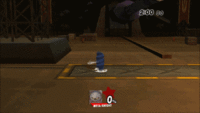
|
|---|
Taunts[edit]
- Up taunt: Wraps himself in his cape, as if teleporting, while scoffing.
- Side taunt: Says "Fight me!" (勝負だ!, Let's battle!), while examining his sword, slashing twice, and finally pointing his sword in front of him.
- Down taunt: Spreads his wings while shouting "Come!" (来いっ!)
| Up taunt | Side taunt | Down taunt |
|---|---|---|
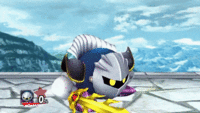
|
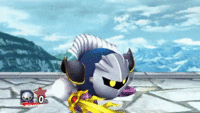
|
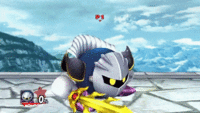
|
Idle poses[edit]
- Quickly and subtly swings Galaxia.
- Puts his cape around him and back.
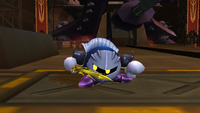 |
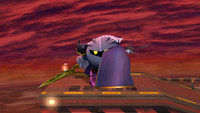
|
|---|
Crowd cheer[edit]
| English | Japanese | |
|---|---|---|
| Cheer | ||
| Description | Me-ta Knight! | Me-ta Knight! |
| Pitch | Group chant | Group chant |
- His cheer is the same between both versions.
Victory poses[edit]
- Up: Flings out his cape and says "You have much yet to learn". ((まだまだだ.。, You're not yet ready.)
- Left: Disappears while saying, "Come back when you can put up a fight!" (もっと強くなって来い.。, Come at me when you're stronger.)
- Right: Turns and spins his sword while saying "Victory... is my destiny", then hits it against the ground. (これも宿命だ., This too was destiny.)
| Up | Left | Right |
|---|---|---|

|

|

|
In competitive play[edit]
Most historically significant players[edit]
- See also: Category:Meta Knight players (SSBB)
Ally - Although best known for his Snake, Ally picked up Meta Knight as a secondary/co-main and achieved nationally dominant results with both characters. He was ranked 8th on the 2014 SSBBRank.
ANTi - Known as one of the best Meta Knights in the world, with multiple top finishes at majors such as Pound V and Apex 2013. Noted for his vast array of matchup experience and knowledge, with him rarely being upsetted at tournaments. He was ranked 11th on the 2014 SSBBRank.
DieSuperFly - One of the most dominant players during Brawl's early competitive life.
Dojo - Was one of the most nationally dominant Meta Knight players from 2009 to 2011, famous as the first player to defeat Mew2King in Meta Knight dittos, at WHOBO 1, where he placed 2nd, and remaining a very strong national threat afterward when he shown up, including getting 9th at Apex 2013. He was ranked 41st on the 2014 SSBBRank.
Etsuji - Was widely considered the best player in Japan along with 9B by the end of Brawl's competitive life, placing 1st at Sumabato X Final and multiple other Japanese tournaments.
Havok - Was known as a top Meta Knight from the West Coast and one of the best in the United States during his prime in the MLG era.
Kakera - Was one of the best players in Japan, placing 5th in singles and 1st in doubles with Otori at Apex 2012, and being ranked 16th on the 2014 SSBBRank.
Lee Martin - A nationally dominant Meta Knight player in his prime during the MLG era. He was ranked 71st on the 2014 SSBBRank.
Mew2King - The most dominant and arguably most famous player in Brawl's competitive history; considered the undisputed best in Brawl's early lifetime, and still remained one of the strongest national threats in the post-MLG era. He was ranked 5th on the 2014 SSBBRank.
Nairo - One of the best Meta Knight players in the world. Holds several tournament victories including SKTAR, Apex 2014, CEO Dreamland, and Super Smash Con 2017. Famous for his aggressive style of play, often using offstage Shuttle Loops and other risky edgeguard maneuvers to prevent opponents from returning to the stage. He was arguably the best player in the world by, and even after, Smash 4's release, being ranked 1st on the 2014, 2016-2017, and 2018-2019 iterations of the SSBBRank.
Otori - He was one of the strongest players in Japan and the world in Brawl's later competitive life, most notably winning 1st in singles and doubles with Kakera at Apex 2012, and being ranked 4th on the 2014 SSBBRank.
RAIN - Known for his extreme dominance in the Japanese scene throughout much of Brawl's competitive life, most notably achieving 1st place at Sun Rise Tournament. He was ranked 14th on the 2014 SSBBRank.
Shadow - A major innovator of MK's metagame in Brawl's early stages; most famed for the "Shadow Loop", using Meta Knight's Shuttle Loop near the air as a powerful edgeguarding technique. While less prominent in Brawl's later competitive life, he was still a national-level threat, who ranked 66th on the 2014 SSBBRank.
Tyrant - Was arguably the best player on the West Coast for most of Brawl's competitive life, and was one of the United States' best players from 2009 to Smash 4's release. He was additionally ranked 13th on the 2014 SSBBRank.
ZeRo - Often considered one of the best players from 2012 to Smash 4's release, including being arguably the best player in the world during his period of dominance in early 2014. He was ranked 3rd on the 2014 SSBBRank.
Tier placement and history[edit]
Meta Knight has been ranked 1st on the tier list since a few months after the game's release, commonly in his own tier above the rest of the cast. Players initially believed Snake was the best character, but as the metagame evolved, Meta Knight's advantages in combat became more evident, and Meta Knight mains such as Mew2King began dominating tournaments, leading to him becoming the game's most commonly used character by far. Meta Knight has significantly better tournament results than the entire roster: many Meta Knight legal tournaments had Meta Knight players taking up more than half of the top 8, and Meta Knight won almost three times the amount of money in tournaments than the second-most successful character, Snake. In the later stages of the game's scene, innovations in the Ice Climbers' metagame, especially their chain grab setups capable of annihilating any player given a single opportunity, led some players to challenge Meta Knight being the best character in practice. Despite this, Meta Knight remained in first place, with the Ice Climbers in the spot below him.
Ban from competitive play[edit]
Due to his perceived "brokenness" and over-centralization of the metagame, Meta Knight's tournament legality was disputed at length for the entirety of Brawl's lifetime. This started with a well-known rumor in the Smash Bros. community that Meta Knight was banned in Italian tournaments. Although the rumor was false, the Italian SmashBoards had asked Smashers if they believed that Meta Knight should be banned. However, this rumor triggered another surge of players who wanted to ban Meta Knight in other regions. The controversy reached the point at which the Smash Back Room held a poll in the middle of 2009 to see if Smashers wanted to completely ban the character. "Pro-Ban" won the poll, but did not win a super-majority of at least 66%, and Meta Knight was not banned on a large scale.[1]
Talks about banning Meta Knight later surged again, owing to Meta Knight's rapidly increasing dominance and Meta Knight players primarily being those who won tournaments and/or took up the top results. Such an example was KTAR 6, where five of the top eight placers used Meta Knight. In addition, data compiled by John Numbers showed that Meta Knight had won over 50% of total tournament earnings in tournaments that had more than thirty entrants. Meta Knight in total won $42,394.32 in 2011 U.S. tournaments when money is split in character usage (and $59,490.07 when not split), while the next most successful character, Snake, had only won $12,125.33 when split (and $20,860.29 with no split). Players also believed the increasing centralization of Meta Knight caused Brawl's metagame to shift too radically, with the positions of many characters on the tier list being determined largely by their ability to take on Meta Knight.
The Unity Ruleset Committee introduced experimental rules in a later ruleset update; one of the new suggested rules was a ban on Meta Knight[2], with another poll conducted in early September 2011. "Pro-ban" again won the poll, but this time with a super-majority of 75%; with this in mind, the Unity Ruleset Committee subsequently announced its official ban of Meta Knight from both singles and doubles play on September 30th, 2011. The ban itself started on January 9th, 2012. [3]
The decision to ban Meta Knight, however, immediately proved controversial. Although a large number of smashers had voted for his banning, a number of top professionals who mained Meta Knight later stated they would not attend tournaments where Meta Knight was banned, and a number of tournament organizers stated that they would ignore the Meta Knight ban, as to keep tournaments profitable by allowing top professionals to enter. Regional differences also began to play a role in how Meta Knight was banned; while a number of powerful regions, such as the Tristate Area, featured numerous top players that used Meta Knight, some smaller regions featured fewer top players who used Meta Knight and they subsequently adopted the ban. As a result, while Meta Knight was banned in some areas, he was not in others, leading to the subsequent fractures in the Brawl competitive scene; with the differing legality of Meta Knight, different regions had different banned stages, as some stages gave too strong a benefit to Meta Knight while not extremely buffing other characters. Furthermore, some top professionals refused to travel to other regions in response to the ban on Meta Knight or lack thereof.
The controversy surrounding Meta Knight and his ban was derided by the Melee community; following his ban, in a newer ruleset update, the Melee Back Room sarcastically added that Meta Knight was banned from all Melee tournaments.[4]
The Unity Ruleset Committee later disbanded on April 16, 2012[5], with Marc stating that "it is up to individual TOs to decide what is best for their events." As a result, Meta Knight's ban is not considered universal, and tournament organizers may choose whether or not to ban the character. Since then, a majority of Brawl tournaments have allowed Meta Knight.
Although the singles ban is controversial, teams consisting of two Meta Knights are universally considered far too powerful and are often banned in doubles.
In Solo Modes[edit]
Classic Mode[edit]
In Classic Mode, Meta Knight can appear as an opponent or ally in Stage 5 along with Kirby and King Dedede on Halberd. Meta Knight can also appear as an opponent in Stage 11, but only if he hasn't appeared in Stage 5.
All-Star Mode[edit]
In All-Star Mode, Meta Knight is fought in Stage 15 alongside Kirby and King Dedede on Halberd.
Event Matches[edit]
Solo Events[edit]
- Event 2: Landmaster Ignition: As Fox with a Smash Ball, the player must survive against Meta Knight and Sheik. Fox must rely on his Landmaster as his opponents take less knockback from his regular attacks.
- Event 3: Pink Ball Repulsion: The player controls Meta Knight and must defeat Kirby before the platform reaches the Halberd portion of the stage.
- Event 20: All-Star Battle x1: Meta Knight is one of the eight opponents fought in this event along with Wario, Pit, Zero Suit Samus, Olimar, Lucas, Diddy Kong, and the Pokémon Trainer.
Co-Op Events[edit]
- Co-Op Event 5: The Yoshi Team of 50: As Meta Knight and Pit, both players must KO all 50 Yoshis on Rainbow Cruise before completing one lap of the stage.
- Co-Op Event 13: Blades of the Quick and Mighty: Marth and Ike must defeat Link, Meta Knight, and Ganondorf on Temple.
- Co-Op Event 20: The Final Battle for Two: Both players select a character and must defeat Bowser, Wario, King Dedede, Wolf, Meta Knight, and Ganondorf on Final Destination.
- Co-Op Event 21: The True All-Star Battle: Both players select a character and take on the entire roster on Battlefield.
Congratulations Screens[edit]
Role in The Subspace Emissary[edit]
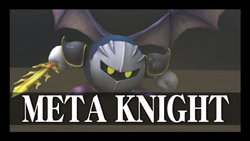
It is revealed that before the events of The Subspace Emissary, Meta Knight was attacked by the Subspace Army, which was intent of stealing the Halberd from him. He was able to hold them off until King Dedede attacked him, causing him to lose his ship.
When Meta Knight is first featured in The Subspace Emissary, he attacks a lone Marth outside of a large castle. He quickly realizes that Marth is not his enemy when they are both surrounded by Primids. After a successful battle, both warriors chase the Ancient Minister, who is carrying a Subspace bomb. Both are unsuccessful in their attempts in destroying the bomb (Meta Knight's left wing was shot by the Ancient Minister's laser, forcing him to land and change to his cape to extinguish the flame); luckily, Ike appears and uses his Aether to catch the Minister off guard and destroy the bomb. With the bomb destroyed, all three head back to the castle to clear out any remaining Primids.
Later, they are all seen traveling the wastelands together and battling Galleom. Meta Knight then saves Lucas and an unconscious Pokémon Trainer from a giant free-fall after they defeat the same boss. Meta Knight then begins to ascend a large cliff face, followed by the Ice Climbers (who see his ascent as a racing challenge), in order to reach the Battleship Halberd. At the summit, Lucario challenges Meta Knight to a sparring duel. To the relief of the Ice Climbers, the winner revives the loser, having no hostile feelings. The Halberd then crashes into the side of the mountain in an attempt to destroy the defeated Great Fox, which is being held by the arm of the Combo Cannon. Meta Knight and Lucario quickly board the Halberd, while the Ice Climbers fall off the summit, into the canyon.
The duo run into Snake while on board and join forces with him to reclaim the Halberd. After rescuing Peach and Zelda, the trio continues on to the control deck. There they discover that the ship is being piloted by a quintet of false Mr. Game & Watches. Snake attempts to dispose of all of them out the window and they land onto the bridge, whereupon they dissolve into Shadow Bugs and form into a fiend known as Duon. Once the monster is defeated, Mr. Game & Watch joins the group, along with Peach, Zelda, Fox, and Falco. Meta Knight remains in the Halberd's control room and does not take part in the battle.
Meta Knight takes back the Halberd and reunites with the members from other groups. The aircraft of the other heroes is placed inside the Halberd, which heads towards the Subspace Gunship with most of the heroes on board. After using the Subspace Battleship's main cannon to create another Subspace rift, Ganondorf and Bowser spot the Halberd on the horizon and orders the battleship to open fire. The Halberd is struck down, but the heroes are able to escape on board Samus's Gunship, Captain Falcon's Falcon Flyer, Olimar's Hocotate Ship and an Arwing. Kirby destroys the Subspace Battleship by slicing through it with the Dragoon air ride machine and the heroes enter Subspace to pursue Ganondorf and Bowser.
Meta Knight is turned into a trophy by Tabuu along with the rest of the fighters upon their entrance into Subspace. He is later revived by Kirby. He rejoins the others in the fight against Tabuu.
Playable appearances[edit]
- The Battlefield Fortress
- The Wilds (Part I)
- The Glacial Peak
- Battleship Halberd Interior
- Entrance to Subspace
- The Great Maze (if rescued in Subspace (Part II))
Exclusive stickers[edit]
The following stickers can be used only by Meta Knight or by a select few including him:
- Bonkers: [Weapon] Attack +16
- Cell Phone: [Slash] Resistance +4
- Dyna Blade: Launch Resistance +46
- Gordo: [Throwing] Power +5
- Hot Head: [Flame] Attack +10
- King Dedede & Kirby: [Specials: Direct] Attack +21
- King Dedede (Kirby Super Star): [Leg] Attack +28
- Kirby (Kirby 64: The Crystal Shards): [Body, Spin] Attack +22
- Kirby (Kirby Air Ride): [Arm, Leg] Attack +17
- Maxim Tomato: Maxim Tomato Effect +50
- Meta Knight: [Slash] Attack +32
- Meta Knight Ball: Launch Power +8
- Nruff: [Body, Spin] Attack +5
- Starman (Kirby: Squeak Squad): Launch Power +33
- Whispy Woods: [Weapon] Attack +4
Trophies[edit]
Meta Knight's main and Final Smash trophies can be obtained by clearing Classic Mode and All-Star mode respectively with Meta Knight.
- Meta Knight
The head of the Meta-Knights, and something of a rival to Kirby. He's quite an accomplished swordsman. Following his code of knightly ethics, he once delivered his sword to Kirby and demanded single combat. His giant cape transforms into wings, giving him the power of flight. He's shown his face briefly before, but his relationship to Kirby is still a mystery.
: Kirby's Adventure
: Kirby Super Star
The head of the Meta-Knights, and something of a rival to Kirby. He's quite an accomplished swordsman. Following his code of knightly ethics, he once delivered a sword to Kirby and demanded single combat. His giant cape transforms into wings, giving him the power of flight. He's shown his face briefly before, but his relationship to Kirby is still a mystery.
: Kirby's Adventure
: Kirby's Fun Pak
- Galaxia Darkness
- Meta Knight's Final Smash. He flips his cape, and the darkness within envelops his foes and plunges the world into shadow. He then unleashes a series of sword strikes that do terrible damage and launch his foes. In the darkness, Meta Knight can also reach and attack distant enemies. One can imagine Meta Knight zipping back and forth at high speed to accomplish this.
: Super Smash Bros. Brawl
Alternate costumes[edit]

| |||||
Reveal trailer[edit]
Gallery[edit]
Meta Knight using Dimensional Cape behind Pit.
Trivia[edit]
- Meta Knight is one of the five playable characters in Brawl to lack a meteor smash.
- Meta Knight is one of only three characters in Brawl able to perform three aerials in one short hop, the others being Lucario and Luigi.
- Meta Knight's eyes are never closed; this is also the case for his SSB4 incarnation.
- Bowser, Meta Knight, Ike and Marth can all perform the Floor glitch.
- Meta Knight is the first character in the series to have a different victory fanfare from other characters of the same universe, and is also the only one in Brawl who has this distinction.
- Meta Knight and King Dedede have repeatedly appeared as antagonists in their home series, but are not antagonists in The Subspace Emissary. Interestingly however, both characters are teased to be antagonists early in the plot.
- Meta Knight, the Ice Climbers, Ganondorf, Mr. Game & Watch, and Samus are the only characters whose icon in The Subspace Emissary and the Sticker menu is not based on their renders.
- Meta Knight in Brawl and Fox in Melee are the only characters to have ever been in an SS tier for their respective games.
References[edit]
- ^ http://www.smashboards.com/showthread.php?t=242903
- ^ http://www.smashboards.com/showpost.php?p=13213667&postcount=3
- ^ http://www.smashboards.com/showthread.php?p=13439900
- ^ https://smashboards.com/threads/tentative-mbr-official-ruleset-for-2012.313252/
- ^ http://www.smashboards.com/threads/the-urc-has-been-disbanded.321154/#post-14342103
External links[edit]
- Meta Knight's page at Smash Bros Dojo!!
- Moveset information at Smash Bros. Dojo!!
- Meta Knight character guide on SmashBoards
- Meta Knight's frame data on SmashBoards
- Video of Meta Knight's hitboxes
| Fighters in Super Smash Bros. Brawl | |
|---|---|
| Veterans | Bowser · Captain Falcon · Donkey Kong · Falco · Fox · Ganondorf · Ice Climbers · Jigglypuff · Kirby · Link · Luigi · Mario · Marth · Mr. Game & Watch · Ness · Peach · Pikachu · Samus · Yoshi · Zelda / Sheik |
| Newcomers | Diddy Kong · Ike · King Dedede · Lucario · Lucas · Meta Knight · Olimar · Pit · Pokémon Trainer (Charizard · Ivysaur · Squirtle) · R.O.B. · Snake · Sonic · Toon Link · Wario · Wolf · (Zero Suit Samus) |
|
| |
|---|---|
| Fighters | Kirby (SSB · SSBM · SSBB · SSB4 · SSBU) · Meta Knight (SSBB · SSB4 · SSBU) · King Dedede (SSBB · SSB4 · SSBU) |
| Assist Trophies | Knuckle Joe · Nightmare · Chef Kawasaki |
| Bosses | Giant Kirby · Marx |
| Stages | Dream Land · Fountain of Dreams · Green Greens · Halberd · Dream Land GB · The Great Cave Offensive |
| Items | Maxim Tomato · Star Rod · Parasol · Warp Star · Apple · Dragoon · Superspicy Curry · Bomber |
| Enemies | Bonkers · Bronto Burt · Gordo · Parasol Waddle Dee · Plasma Wisp · Shotzo · Tac · Waddle Dee · Waddle Doo |
| Other | Gourmet Race · Whispy Woods |
| Trophies, Stickers and Spirits | Trophies (SSBM · SSBB · SSB4) · Stickers · Spirits |
| Music | Brawl · SSB4 · Ultimate |
| Masterpieces | Kirby's Dream Land · Kirby's Adventure · Kirby Super Star |






